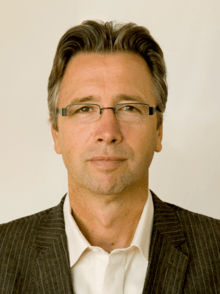Thomas Ebbesen
Thomas Ebbesen (born 30 January 1954 in Oslo) is a franco-norwegian physical chemist and professor at the University of Strasbourg in France, known for his pioneering work in nanoscience. He received the Kavli Prize in Nanoscience “for transformative contributions to the field of nano-optics that have broken long-held beliefs about the limitations of the resolution limits of optical microscopy and imaging”, together with Stefan Hell, and Sir John Pendry in 2014.

Thomas Ebbesen obtained his bachelors from Oberlin College, and a PhD from Pierre and Marie Curie University in Paris in the field of photo-physical chemistry. He then worked at the Notre Dame Radiation Laboratory before joining the NEC Fundamental Research Laboratories in Japan in 1988 where his research shifted first to novel carbon materials such as fullerenes (C60), graphene and carbon nanotubes. After discovering how to mass-produce carbon nanotubes,[1] he and his colleagues measured many of their unique features such as their mechanical[2] and wetting properties.[3] For his pioneering and extensive contribution to the field of carbon nanotubes, he shared the 2001 Agilent Europhysics Prize with Sumio Iijima, Cees Dekker and Paul McEuen.
While working at NEC, Ebbesen discovered a major new optical phenomenon. He found that, contrary to the then accepted theory, it was possible to transmit light extremely efficiently through subwavelength holes milled in opaque metal films under certain conditions.[4] The phenomenon, known as extraordinary optical transmission, involves surface plasmons. It has raised fundamental questions and is finding applications in broad variety of areas from chemistry to opto-electronics.[5] Ebbesen has received several awards for the discovery of the extraordinary optical transmission such as the 2005 France Telecom Prize of the French Academy of Sciences and the 2009 Quantum Electronics and Optics Prize of the European Physical Society.
His current research is focused on the physics and chemistry of light-matter interactions at the nanoscale.
In 1999, Thomas Ebbesen joined ISIS[6] founded by Jean-Marie Lehn at the University of Strasbourg, which he headed from 2004 to 2012. He is the director of the International Center for Frontier Research in Chemistry.[7] and the University of Strasbourg Institute for Advanced Study.[8] He is a member of the Institut Universitaire de France, the Norwegian Academy of Science and Letters, the French Academy of Science and the Royal Flemish Academy of Belgium for Sciences and the Arts.
In 2019, he is awarded the CNRS Gold medal in France[9]
He is married to the pianist Masako Hayashi-Ebbesen. They have two daughters.
Awards
- NEC Research Prize 1992
- Randers Prize 2001
- Agilent Europhysics Prize 2001
- Prix France Telecom 2005
- Tomassoni Prize 2009
- Scola Physica Romana Medal 2009
- Quantum Electronics and Optics Prize 2009
- Dr. Scient. H.C., University of Southern Denmark 2009
- Kavli Prize in Nanoscience 2014
- Prix Special of the French Physics Society, 2014
- Honorary Doctorate, Oberlin College, USA 2015
- Knight of the French Legion of Honour[10]
- Doctor honoris causa on the occasion of the KU Leuven Patron Saint‘s Day 2018[11]
- Quinquennial Anniversary Award, European Materials Research Society 2018 [12]
- 2018 Grand prix de la fondation Maison de la Chimie 2018 [13]
- 2019 CNRS Gold medal
References
| Wikimedia Commons has media related to Thomas Ebbesen. |
- Ebbesen, T. W.; Ajayan, P. M. (1992). "Large-scale synthesis of carbon nanotubes". Nature. 358 (6383): 220. Bibcode:1992Natur.358..220E. doi:10.1038/358220a0.
- Treacy, M. M. J.; Ebbesen, T. W.; Gibson, J. M. (1996). "Exceptionally high Young's modulus observed for individual carbon nanotubes". Nature. 381 (6584): 678. Bibcode:1996Natur.381..678T. doi:10.1038/381678a0.
- Dujardin, E.; Ebbesen, T. W.; Hiura, H.; Tanigaki, K. (1994). "Capillarity and Wetting of Carbon Nanotubes". Science. 265 (5180): 1850. Bibcode:1994Sci...265.1850D. doi:10.1126/science.265.5180.1850. PMID 17797225.
- T.W. Ebbesen, H.J. Lezec, H.F. Ghaemi, T. Thio, and P.A. Wolff, Extraordinary optical transmission through sub-wavelength hole arrays. Nature 391, 667 (1998)
- Genet, C.; Ebbesen, T. W. (2007). "Light in tiny holes". Nature. 445 (7123): 39. Bibcode:2007Natur.445...39G. doi:10.1038/nature05350. PMID 17203054.
- isis-ulp.org.
- icfrc.fr.
- usias.fr.
- "Thomas Ebbesen, physical chemist, awarded the CNRS Gold Medal for 2019". CNRS. 2019-07-09. Retrieved 2019-09-28.
- "Bernard Derrida, Thomas Ebbesen, Antoine Georges et Clément Sanchez, nommés au grade de chevalier dans l'Ordre national de la Légion d'honneur" (in French). Académie des sciences. Retrieved 2018-11-06.
- "Patron Saint's Day Honorary Doctors". KU Leuven. Retrieved February 2, 2018.
- "Quinquennial ANNIVERSARY AWARD - Thomas W. Ebbesen". European Materials Research Society. Retrieved 2018-11-06.
- "Les lauréats 2018" (in French). Fondation de la Maison de la Chimie. Retrieved 2018-11-06.